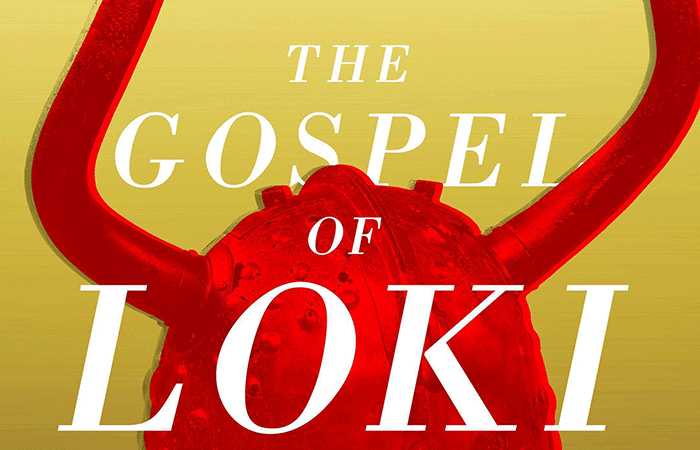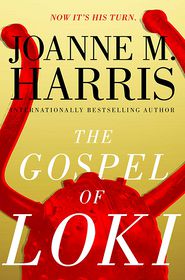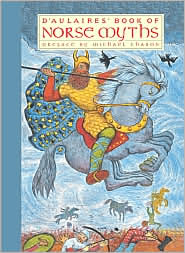Get the Trickster’s Side of the Story in The Gospel of Loki
 My father’s side of the family inordinately clove to its Scandinavian heritage. My grandfather spoke Danish as a boy in Iowa, until his mother died of childbed fever when he was six, and he forgot all of his Danish. We later generations thought his embrace of all things Scandinavian was his way of keeping her close, reaching past the lost language to his lost mother. I have uncles named Odin and Tore. My grandparents, both vociferous readers, gave me copies of the Icelandic Sagas and the incomparable D’Aulaires’ Book of Norse Myths.
My father’s side of the family inordinately clove to its Scandinavian heritage. My grandfather spoke Danish as a boy in Iowa, until his mother died of childbed fever when he was six, and he forgot all of his Danish. We later generations thought his embrace of all things Scandinavian was his way of keeping her close, reaching past the lost language to his lost mother. I have uncles named Odin and Tore. My grandparents, both vociferous readers, gave me copies of the Icelandic Sagas and the incomparable D’Aulaires’ Book of Norse Myths.
The Gospel of Loki
The Gospel of Loki
In Stock Online
Hardcover $25.99
My experience of the Norse myths was always tinged with my grandfather’s nostalgia and sorrow, which is strangely discordant with the elemental fire and ice of the legends themselves. More so than the Greco-Roman pantheon, who often seem urbane despite (or because of) their endless warmongering, the Norse gods are forever off in the tundra, scrapping with dwarves and frost giants and gods know what else, hand-to-hand, one-on-one. They’re not strategists, these gods, not like the Greeks. They’re more familiar, in the original sense of the word.
For me, slipping into Joanne M. Harris’ The Gospel of Loki is like encountering family. I feel like I’m sitting in the corner at a reunion with the shabbily treated cousin, hearing his version of events—just this much, but not wholly, in concordance with the accepted account. Here, the cousin is, of course, Loki. I always found him to be such a compelling character, so unlike the doddering personifications of the other gods. Say, for instance, one is the god of fishermen, protecting them in the storm; his wife is the goddess of drowned men, dragging them down in her nets. These aren’t characters with psychology, but dualistic reckonings of natural forces. Loki, now he’s different, a trickster who frequently gets himself in trouble due to impulse and ego. I don’t know about you, but I can relate to that much more easily than to Skadi, the goddess of mountains, skiing, and bowhunting.
The other chief character Harris concerns herself with is Odin the One-Eyed, blood brother of Loki. Medieval Scandinavians threw much of their worship behind Thor, the god of soldiers and thunder, who was garrulous and dumb, the kind of god you could have a beer with. They feared and placated Odin, the All-Father, because dad is scary, and he had Dad Voice even then. Harris’ Odin is not dissimilar, but to hear Loki tell it, Odin is not as all-seeing as he makes himself out to be, using Loki as a storehouse for his failings and deviousness. In the myths, Odin often comes off as paternalistic (surprise!), but here, again and again, Loki reminds you they are brothers. In some ways, Odin’s wise sage routine is predicated on Loki’s impulsive screw ups. Odin can take credit when Loki drags the Aesir out of a jam because, of course, he knew all along that Loki could. Boy, that would rankle.
The plot follows very closely the events of the Poetic and Prose Eddas, medieval collections of Norse culture and mythology from which we get most of our knowledge of this particular pantheon. As such, it’s episodic and, for lack of better word, completely bananas. The universe came to be due to a great cow licking the giant Ymir and the first person, Buri, out of a great void of ice. (Don’t ask where the cow came from; pay no attention to the cow behind the screen.) They’re pretty great stories just by themselves—I regaled my husband with Loki stories after reading, as his only previous encounter with the mythos came by way of Marvel comics—but it definitely improves with a Humble Narrator as radical as this one. Harris’ Loki is a masterful example of narrative voice: anachronistic, prevaricating while cajoling the reader, untrustworthy, nevertheless charming and seductive. Oh, baby.
My experience of the Norse myths was always tinged with my grandfather’s nostalgia and sorrow, which is strangely discordant with the elemental fire and ice of the legends themselves. More so than the Greco-Roman pantheon, who often seem urbane despite (or because of) their endless warmongering, the Norse gods are forever off in the tundra, scrapping with dwarves and frost giants and gods know what else, hand-to-hand, one-on-one. They’re not strategists, these gods, not like the Greeks. They’re more familiar, in the original sense of the word.
For me, slipping into Joanne M. Harris’ The Gospel of Loki is like encountering family. I feel like I’m sitting in the corner at a reunion with the shabbily treated cousin, hearing his version of events—just this much, but not wholly, in concordance with the accepted account. Here, the cousin is, of course, Loki. I always found him to be such a compelling character, so unlike the doddering personifications of the other gods. Say, for instance, one is the god of fishermen, protecting them in the storm; his wife is the goddess of drowned men, dragging them down in her nets. These aren’t characters with psychology, but dualistic reckonings of natural forces. Loki, now he’s different, a trickster who frequently gets himself in trouble due to impulse and ego. I don’t know about you, but I can relate to that much more easily than to Skadi, the goddess of mountains, skiing, and bowhunting.
The other chief character Harris concerns herself with is Odin the One-Eyed, blood brother of Loki. Medieval Scandinavians threw much of their worship behind Thor, the god of soldiers and thunder, who was garrulous and dumb, the kind of god you could have a beer with. They feared and placated Odin, the All-Father, because dad is scary, and he had Dad Voice even then. Harris’ Odin is not dissimilar, but to hear Loki tell it, Odin is not as all-seeing as he makes himself out to be, using Loki as a storehouse for his failings and deviousness. In the myths, Odin often comes off as paternalistic (surprise!), but here, again and again, Loki reminds you they are brothers. In some ways, Odin’s wise sage routine is predicated on Loki’s impulsive screw ups. Odin can take credit when Loki drags the Aesir out of a jam because, of course, he knew all along that Loki could. Boy, that would rankle.
The plot follows very closely the events of the Poetic and Prose Eddas, medieval collections of Norse culture and mythology from which we get most of our knowledge of this particular pantheon. As such, it’s episodic and, for lack of better word, completely bananas. The universe came to be due to a great cow licking the giant Ymir and the first person, Buri, out of a great void of ice. (Don’t ask where the cow came from; pay no attention to the cow behind the screen.) They’re pretty great stories just by themselves—I regaled my husband with Loki stories after reading, as his only previous encounter with the mythos came by way of Marvel comics—but it definitely improves with a Humble Narrator as radical as this one. Harris’ Loki is a masterful example of narrative voice: anachronistic, prevaricating while cajoling the reader, untrustworthy, nevertheless charming and seductive. Oh, baby.
D'Aulaires' Book of Norse Myths
D'Aulaires' Book of Norse Myths
By
Ingri d'Aulaire
,
Edgar Parin d'Aulaire
Preface by
Michael Chabon
In Stock Online
Hardcover $29.95
There are some changes to the mythic structure that won’t interest anyone but the biggest of Norse nerds (so I won’t bore you). The coolest things Harris does with the gospel have nothing to do with the points of divergence, but where she throws the emphasis. One of the things that always made my head hurt as a kid is that so much of Norse myth is in the future tense. All of the stories about Ragnarok have presumably not come to pass, as we common folk are all still here, boogying on. But the end-of-days stories are also detailed and specific, starting with the death of Balder (engineered by Loki), ending with the sun and moon being swallowed by wolves and all Hel breaking loose. Presumably, all the gods know exactly who will kill whom when it all finally hits the fan.
As someone who was raised Episcopalian, it’s not like I’d never heard of end time revelations before, but the treatment of prophesy is fundamentally different in Norse myth than in biblical Revelations. There’s no clear break between what has happened and what will happen, no seeding the world with signs of the end times; no preparation, no intervention. Loki will kill Balder; he will be punished for it; he will escape and bring the world down on him in flames. (Uh, spoiler alert?)
Whenever I tell Loki stories, my instinct is to excuse him, even though I know much of what he does is inexcusable. Harris does something subtler than excusing him (though Loki himself makes a show of it), twisting two end-times prophesies together into one of the longest cons I’ve ever encountered on the page. This is a gospel, remember? She even tells you what she’s doing, right at the beginning, but you forget, entranced by Loki, Father of Lies. Even Loki’s head hurts as he considers the larger play. The Gospel of Loki is a shell game you didn’t even know you were playing, and even though you’re bound to lose, it’s worth jumping into the game.
Let there be…
There are some changes to the mythic structure that won’t interest anyone but the biggest of Norse nerds (so I won’t bore you). The coolest things Harris does with the gospel have nothing to do with the points of divergence, but where she throws the emphasis. One of the things that always made my head hurt as a kid is that so much of Norse myth is in the future tense. All of the stories about Ragnarok have presumably not come to pass, as we common folk are all still here, boogying on. But the end-of-days stories are also detailed and specific, starting with the death of Balder (engineered by Loki), ending with the sun and moon being swallowed by wolves and all Hel breaking loose. Presumably, all the gods know exactly who will kill whom when it all finally hits the fan.
As someone who was raised Episcopalian, it’s not like I’d never heard of end time revelations before, but the treatment of prophesy is fundamentally different in Norse myth than in biblical Revelations. There’s no clear break between what has happened and what will happen, no seeding the world with signs of the end times; no preparation, no intervention. Loki will kill Balder; he will be punished for it; he will escape and bring the world down on him in flames. (Uh, spoiler alert?)
Whenever I tell Loki stories, my instinct is to excuse him, even though I know much of what he does is inexcusable. Harris does something subtler than excusing him (though Loki himself makes a show of it), twisting two end-times prophesies together into one of the longest cons I’ve ever encountered on the page. This is a gospel, remember? She even tells you what she’s doing, right at the beginning, but you forget, entranced by Loki, Father of Lies. Even Loki’s head hurts as he considers the larger play. The Gospel of Loki is a shell game you didn’t even know you were playing, and even though you’re bound to lose, it’s worth jumping into the game.
Let there be…

